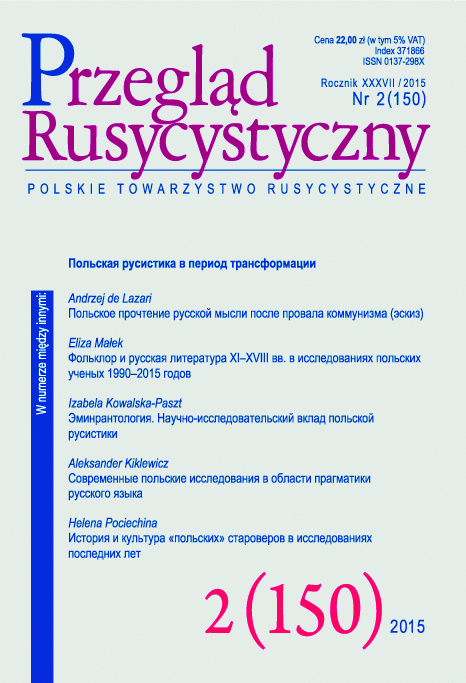С «поцелуя на морозе» по «червивую мякоть Крыма». Польско-российские отношения в польской гуманистической рефлексии последних 25 лет
From "The kiss in the cold water" for "grubby pulp of Crimea", or he Polish-Russian relations ion the Polish humanities or the last quarter
Author(s): Tadeusz SucharskiSubject(s): Philosophical Traditions, Social history, Culture and social structure , Transformation Period (1990 - 2010), Philology
Published by: Polskie Towarzystwo Rusycytyczne
Keywords: Polish-Russian relations; post-communism; trasformation period; collective consciousness; Polishness; Russianness
Summary/Abstract: The aim of the present work is to show the most important achievements of the Polish humanities devoted to Polish-Russian relations disclosed in the era after the fall of communism. The main attention was focused on literary works, but in the perspective of the research were also the work of linguistic, historical, and sociological. As a result, it became possible to show the full spectrum of the Polish reflection devoted to relations with Russia. A large number of books, studies, articles proves the extraordinary significance of the problem prohibited by the communist authorities for years. The issue of the reflection on Polish-Russian relations was often focused on the dialogue of cultures. The research on mutual stereotypes, the searching for sources of mutual prejudices, the importance of Russia in the Polish collective consciousness have proved particularly successful. The researchers emphasized the differences in the spirituality of the two nations, but they suggested the need of the development of good relations between the two nations. The reading of many works proves that the desire to show the human face of Russia, the hope of close relations with Russia and Russians was one of the main determinants of Polish reflection. The concept of „other” Russia returns in the works of many authors. It appears already in the works on literature nineteenth century, reaching its apogee in the reflection on the Polish references postwar exile. It appeared already in the works devoted to the Polish romantic literature, but it reached its apogee in the reflection on the post-war Polish literature, especially on the émigré literature. The need to overcome the tendency to identify the Soviet regime with the Russian nation, the tendency to blur the distinction between oppressors and victims was particularly strongly articulated in these works.
Journal: Przegląd Rusycystyczny
- Issue Year: 2015
- Issue No: 150
- Page Range: 21-49
- Page Count: 29
- Language: Russian

